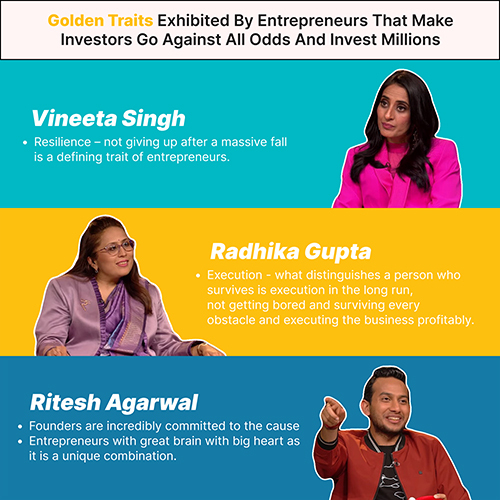Shark Tank India: How to secure deals from Sharks? Vineeta Singh, Ritesh Agarwal, and Radhika Gupta reveal
Have you ever thought about what it takes to create winning pitches that guarantee investment? Ritesh Agarwal, Vineeta Singh, and Radhika Gupta, the judges of Shark Tank India 3, spill the beans.

Shark Tank India is not just a show; it's a gateway for aspiring business minds to showcase their innovations to the best in the industry, the Sharks. While every pitcher wishes to secure a deal from the Sharks, only some are lucky. Whether you are an aspiring business person or somebody prepping to get an investment, one question you must have had is - What is the secret of a great pitch?
Well, we have got the answers from Sharks Vineeta Singh, Radhika Gupta, and Ritesh Agarwal.
How Sharks identify start-ups with potential to make it big
It goes without saying that not all pitches manage to get a deal on Shark Tank India. Even in the outside world, many businesses fail even before starting because of a lack of funds. However, there are many instances when a business soared, getting millions of funds even when it had nothing, but determination to make it big.
The Sharks shared the traits of a founder that make them stand out and convince the investors of their potential. Shark Radhika Gupta said that even outside the show, she is in the business of giving money and there are certain parameters she looks at. She said, “I think most investors look at input parameters, you can't say a company today is 100 it's going to become a billion, nobody can say that with certainty.”
There are three input parameters for Radhika Gupta which are the same in all companies. One is the founder. “We always say management triumphs a certain sense of hustle, a certain amount of resilience, humility and a lot of focus because in early stages people tend to be all over the place.”
She believes that the second factor is whether the company is addressing a significant issue for consumers. Otherwise, they would just be a solution looking for a problem, which is the case for many products already available in the market.
And lastly, the numbers have to work and one should be able to do sensible business building. “It has nothing to do with English and understanding of terminologies, it's actually the ability to sell a product and eventually make money on it,” concludes Gupta.

Shark Vineeta Singh also added her insights. She agreed with what Radhika Gupta said, “I think we talk a lot about when you do, especially in the early stage. If I look at my Shark Tank portfolio, out of like the 25 deals in seasons one two, there would be maybe like only two or three that will hit this, I mean forget billion but we're talking about like you know 500 odd crores, 1000 crores kind of outcomes, a lot of them will actually just not be able to survive, and a lot of them will just probably do well but you'll not have an exit. So the entire Angel funding math works that way.”
Talking about taking early bets, she added that the only thing that one can rely on is the founder. So, the investor should look at factors like if he likes working with the founder, if the founder is somebody who's resilient because business models change a lot.
The entrepreneur also talked about her failed businesses. Singh said, “I had three failed businesses, one pivot. So many good businesses have come out of a pivot. Now how can an investor predict a pivot right? So you just have to take a bet on the founder.”
Further, Singh also addressed another factor, a mistake which she also repeated many times. “Another thing I would like to add, I think one of the things which a lot of founders don't think about and I didn't in my own journey and I made that mistake over and over again is the Target Addressable Market,” said Singh.
Ritesh Agarwal shares the points of why he invests in start-ups. The entrepreneur said that entrepreneurship is a lonely journey and the primary reason for him to invest is to be able to partner and spend time with thoughtful people.
Agarwal shared, “Thinking about new ideas when you meet new entrepreneurs there's a sense of energy in the room. It pushes me more. The second thing that I feel is a big reason that I like to invest in startups is I learn so much. I think I learn more from entrepreneurs than others because they are so resourceful - constantly coming up with new ideas.”
Ritesh Agarwal on what should be the intent of the investor
The youngest Shark on the panel, Ritesh Agarwal started with a piece of advice; “I believe that if you want to be an angel investor, if you begin with the intention that I have to make a lot of money you're going to be up for a lot of disappointment, my friend.”
He shared some key points that should be the intent of the investor. Agarwal noted the following intentions:
- It could be learning more about the industry
- It could be the sheer joy of working with a founder
- It could be the ability to make long-term healthy returns
- It could be the opportunity to invest more when the company has a bigger round
Parameters that define a successful pitch
One of the most common questions that float on everyone’s mind is- how to craft the perfect pitch. Well, there are a few secrets that could impress the Sharks.
Ritesh Agarwal shared, “Sometimes entrepreneurs have a contagious sense of passion like you can see the entrepreneur and feel beyond words like you can say that you know this is a person I want to do business with.”
Secondly, the founder and CEO of OYO Rooms believes that the pitchers need to come across as individuals that sharks can collaborate with.
“Last but not least, I think, you will have to have a sense of whether they're doing it for the long term, are they battle-tested or not or are they still in because a lot of people give up right before the success story is going to start,” concluded Agarwal.
Vineeta Singh agreed with Ritesh Agarwal and added some of her insights. She added, “I think one of the biggest things for me is humility. To execute well over 20-30 years you need to become a learning machine, for which you need to have that humility to learn from wherever you get. If you don't have humility, sooner or later somebody is going to out-execute you.”
For the Shark Tank India 3 judge, the second thing is numbers. “Numbers are being gamed now. In Shark Tank, sometimes people specifically say numbers like 6.32, just to indicate that they know numbers and they're going into the last decimal.” She suggests pitchers should not try to do that.
For Vineeta Singh, the third factor is the passion for the business category and love for the consumer. She thinks founders should try to take the money out of the equation and question themself if they still want to do it.
“If you don't enjoy this work, you're going to quit at some point and it might be just before the tipping point,” concluded Vineeta.
Common mistakes Pitchers make about numbers on Shark Tank India
Vineeta Singh also points out the common mistake about numbers that pitchers often make on Shark Tank India. “You'll see two types of founders; one type will come and say a random number which makes no sense and then they have no idea where it's coming from and then another where there was no number but first principles say they built that number and it just sounds logical and I think that's again the difference in being able to sell your TAM,” noted Singh.

Are you ready to pitch your business?
In conclusion, navigating how to secure deals from industry titans like Vineeta Singh, Ritesh Agarwal, Anupam Mittal, Aman Gupta, and Radhika Gupta demands a combination of strategy and determination. Their insights provide invaluable lessons on the importance of a compelling pitch, unwavering belief in one's vision, and the ability to adapt and learn from feedback.
Whether you're a budding entrepreneur or an established player seeking collaboration, the experiences of Vineeta Singh, Ritesh Agarwal, and Radhika Gupta serve as a roadmap to secure investments.





 JOIN OUR WHATSAPP CHANNEL
JOIN OUR WHATSAPP CHANNEL














































































